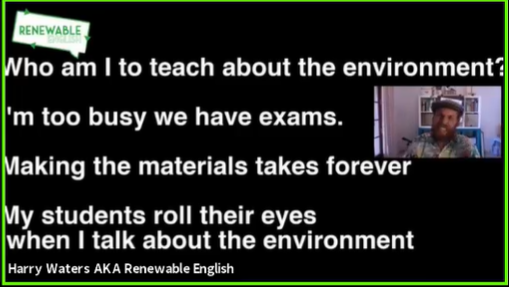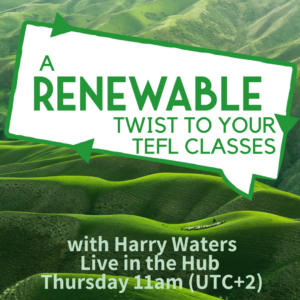It was wonderful to have Harry back again for another session after the success of his Zooming Around webinar back in January.
We started out by chatting about where Harry’s passion for Renewable English came from. After becoming more eco-conscientious following illness, he realised when his daughter was born that he could (and should) do more for the environment; then when he started working at a language school, he realised that he had access to lots of young minds! And not just in terms of telling them what they could do, but also raising their awareness of the power that they had to enact change. When Covid hit, he realised he had the time to devote to building the project, with the idea of reaching as many people as possible with a positive message of what we can do on a small scale. As with any sustainability journey, it starts out with what you can do but we also need to strive to make changes and part of the project involves seeing changes they can through collective action. He also felt that coursebooks introduced the topic of the environment in a boring which, which often induced eco-anxiety.
Harry started with a fun activity of ‘where are you on the scale today?’ in which there’s a series of images on a theme for people to choose which one that most identify with at that moment. A really nice idea for the classroom – you can use characters or personalities that your students are familiar with or get a student to create one each lesson as a nice way to bring their own interests into the classroom.
We then kicked off with a Menti presentation – a great tool for using interactive presentations in your lessons. The first question was about going off-topic in classes.

Tangents are a way of allowing students to express themselves, as well as working with emergent language – we’ll come back to tangents in a moment!
He then shared some of the objections which people sometimes have to introducing the environment into the classroom. Katherine Bilsborough and Ceri Jones presented a webinar back on January on Re-inventing the Green Wheel and you can find a summary of the webinar on the MaWSIG blog.
There is always a question of time and many of us might feel like we don’t have enough ‘extra’ time to allow for tangents or to dedicate time to sustainability. Harry suggested encouraging tangents to be environmentally related or planning in a five-minute slot into every lesson to allow for some chat around eco projects – some sustainable reflections or some eco-mindfulness.
We then chatted about some of our reasons not to incorporate the environment into our lessons:

We looked at the question of whether students find it boring and Harry went on to talk about his passion for vexilology (the study of flags) and how this has rubbed off on his students – and (on a tangent) there was some interesting discussion around our own views of flags in the chat.
Going back to the Menti, eco-anxiety is real and it’s important to look at the positive things which ARE happening. It’s also great to show our students some positive (young) role models – particularly when they see how many followers some of these activists have! For example, Amy and Ella Meek of Kids Against Plastic or Sarah Goody who founded Climate Now found their passion in their early teens and are doing things because they genuinely want to help, rather than for the followers or the adulation.
Another response for eco-anxiety is: don’t get sad, get angry. Rather than punishing yourself when things go wrong – as nobody’s perfect – do something about it, but know that you can’t do everything.
Harry also chatted a little about the UN’s 17 Sustainable Development Goals and suggests looking at your materials at the start of the year and how you can introduce one of the SDGs into a topic or lesson. They are about different social justice topics, not just the environment, so are a great way to raise students’ awareness of other issues around the world.
Producing your own materials does take time, but there are lots of resources out there. Harry has some fantastic free lessons on the Renewable English website (and you can donate here if you like to help keep it going) and you could also check out ELTSustainable.
Some practical tips
Listen to your students and take action – this shows them that they have a voice. It can start with something simple, like a student requesting a lesson on a particular topic – if you do a lesson on that, it shows them that they can be heard and they have the power to enact change.
Write a haiku on an acrostic poem about a sustainable topic related to the unit. It’s great to get students being creative and can be an easy routine for each unit.
Organise a swap shop at your centre for books, clothes, toys and more! And check out Vinted or other secondhand (pre-loved) sites if you’re looking for things yourself. And if you’re interested in living with less, check out The Minimalists.
Teach the buzzwords as they’ll be seeing them popping up all over social media and with the language of protest being English, it’s a fabulous way to teach new language. As a language learner, you might see the word frequently and get the gist of what it is, but you won’t know the word automatically. Get learners making protest signs – check out Harry’s Instagram to see examples of what his learners have been up to.
If you have exam-prep classes, get students to source their own sustainable articles or podcasts and then have them create an exam-style activity from it.
After exams at the end of the year is a great opportunity to do some projects with your students. You could do an upcycling project with your VYLs and have them create something from ‘rubbish’ related to one of the topics from their coursebook. They can then create a story around the object they create.
A litter-pick challenge is also a fun activity to bring the outside world into the classroom (remind students of the safety issues involved). Picker Pals’ Patrick Jackson likened litter-picking to a gateway drug to sustainability! There was a video shared in the chat about children in the UK doing a beach clean, though it might not be available to view outside the UK unless you have a VPN. If you can access BBC Newsround, it’s a news programme aimed at children so could be a good resource for your lessons to engage learners in current affairs.
Charts are a great way to engage students, e.g. who brought their snack in a Tupperware box rather than wrapped in clingfilm? Having a visual helps to encourage people to get involved and they can be really easy to create on Canva.
Get your older students to make eco action Insta-ry or TikTok-y and have a challenge for who can get the most views. Get them to put the hashtags that will get their videos seen by more people (remind students about online safety and check your school’s policy about encouraging them to share).
We can also a planet cooler at the end of the lesson with a quick tip for what they can do (we can also do a planet warmer to start the lesson, but real we want to cool the Earth!). It could be students sharing what they’ve done that week (both the good and the ‘bad’).
A final reminder that you can watch Harry’s lessons on the Renewable English YouTube channel – he’s coming to the end of series one later in June but already has plans for series 2 (how it works) and 3 (the path to activism). He’s doing a fundraiser in the run-up to his last lesson on Thursday 24th called Caps off for Kids Against Plastic and will be shaving his head live during the lesson! If you want to get involved, you can donate on the Just Giving page J
The lessons are really well structured, with some vocabulary to start followed by some UnFun Facts. Then there’s an interview with an expert and a Planet Promise at the end, all mixed in with some comprehension questions.
He’s currently on a campaign to get Greta to come along as an expert – so please do get involved and add some likes to Harry’s posts there!
Feel free to get in touch with Harry – we’ve shared all his social media so far except the Renewable English Facebook page!
Huge thanks to Harry for joining us to share his passion and with a slight tangent to finish, he did some awesome streaming trickery during the session using a programme called OBS.
